Ilona Gerbakher was working as a translator at the United States Holocaust Memorial Museum in Washington, D.C., when a research fellow requested her aid in a project.
Gerbakher, then a student at Santa Monica College, already spoke six languages. She agreed to collaborate with the researcher on studies in Islamic law regarding non-Muslim citizens in 19th century Iran, Egypt and Morocco.
The work sparked in Gerbakher a strong interest in the topic. In April, the fourth-year Middle Eastern and North African Studies student will return to Washington, D.C., to present her research on women in Islamic law to Congress.
The opportunity came through the Posters on the Hill competition, hosted annually by the Council on Undergraduate Research. Posters on the Hill received 700 abstracts this year. Only 74 were accepted, 14 of which were in the humanities, said Nancy Hensel, the executive officer of the Council on Undergraduate Research.
Soon after her experience working at the Holocaust Museum, Gerbakher transferred to UCLA as a philosophy major. There she continued to build an interest in Islamic law after taking a course with Michael Morony, a professor of Near Eastern history.
“I love philosophy and I love history, and (the class) was about the Middle East, which was an area that I had just discovered,” Gerbakher said. “Because I was interested in female intellect in Judaism, and this was a class on Islam, I thought, “˜Okay, let’s look at the way Islam treats the question of female intellect.'”
Gerbakher was born into a Jewish family, but said she perceives strict limitations on female intellect within the faith. In Morony’s course, she saw parallels in Islam. She began to delve into the role of female intellect in Islamic law from a historiographic perspective, which emphasizes the theory and philosophy behind historical writing.
Gerbakher excelled in the course, which led her to pursue the topic further. She talked to Morony and he gave her permission to join a graduate seminar he was teaching on Islamic historiography winter 2010.
Morony said Gerbakher showed a lot of initiative in class, and her research was on par with that of graduate students.
Gerbakher spent a lot of time at UCLA’s Undergraduate Research Center while conducting research for Morony’s graduate seminar, and it was there she first heard about the Posters on the Hill competition.
One of the main objectives underlying her motivation to speak to Congress directly is to try and promote undergraduate research, Gerbakher said. “I am going to personally speak on behalf of the UCLA undergraduate community to my senators and congressmen so that they continue to support undergraduate research in California and at UCLA,” she said.
From an expansive library collection to the Undergraduate Research Center, UCLA offers a wide range of opportunities to undergraduates who want to get involved in their fields. The most important resource is a professor to work with, Gerbakher said.
Choosing a topic can be even more intimidating, she said. But she offered a strategy.
“Find something that bothers you … find something that really makes you angry,” she said. “That’s something that you’ll really want to research. That’s what I did with female intellect and religion.”
Upon graduation, Gerbakher hopes to continue her studies of women’s intellect in religion in a master’s or a graduate program. She has applied to numerous Middle Eastern studies graduate programs around the country, including Georgetown, Harvard and UCLA. This summer she plans to travel to Egypt to study Arabic at Cairo’s American University.
“If I could be somebody who helped legislators around the world understand Islamic law and how its not actually as forbidding to women as some people have read it to be, then I think I’ll have lived a good and happy life,” Gerbakher said.
